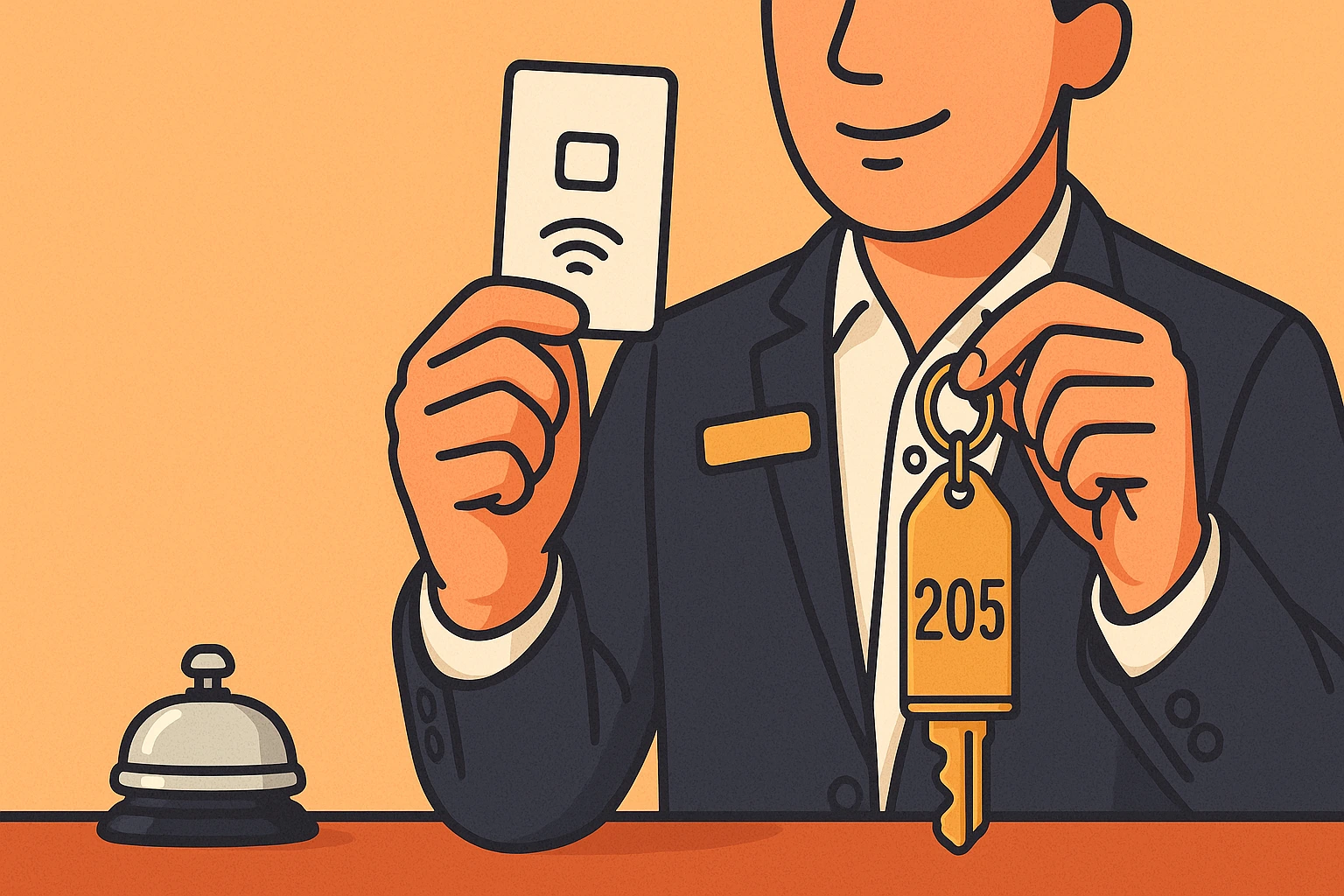In the modern hospitality industry, hotels are navigating complex security challenges where traditional key management systems meet cutting-edge digital solutions. The critical decision between traditional hotel key management vs. digital key management systems remains essential for hotel operators and property managers.
Today, in this comprehensive guide, we will bridge the divide by exploring both approaches’ key differences, advantages, and disadvantages.
Table of Contents
What is Traditional Hotel Key Management?
Traditional hotel key management refers to manual key control systems using physical keys, lockboxes, and manual tracking methods. It involves direct staff oversight and physical key distribution throughout hotel operations.
Here are some main characteristics of Traditional Hotel Key Management:
- Physical Keys:Relies on metal keys and manual key cabinets, creating tangible security control.
- Staff Oversight:Requires direct staff supervision for key distribution and tracking, fostering accountability.
- Limited Geographical Reach:Customers are restricted to the store’s location, limiting the potential market size.
- Fixed Access Points:Keys must be collected and returned at specific hotel locations during operational hours.
Advantages of Traditional Hotel Key Management
- Direct Accountability:Physical key management enables direct staff oversight and clear responsibility chains.
- Instant Access:Staff can obtain keys immediately when needed, ensuring rapid response to guest requests.
- Proven Reliability:Traditional key systems have established track records in hotel security operations.
Disadvantages of Traditional Hotel Key Management
- Manual Labor Costs:Staff time for key tracking, distribution, and management can be significant operational burdens.
- Limited Scalability:Physical key systems become increasingly complex and unmanageable as hotel operations expand.
- Security Vulnerabilities:Physical keys can be lost, duplicated, or stolen, creating potential security breaches.
What is Digital Hotel Key Management?
Digital hotel key management refers to electronic key control systems using smart technology, RFID tracking, and automated dispensing systems. It leverages advanced technology to secure hotel operations and offers comprehensive key monitoring capabilities.
Some key characteristics of Digital Hotel Key Management:
- Electronic Interface:Operates through digital key cabinets and mobile applications, providing secure access control from authorized locations.
- Centralized Control:The ability to monitor and control all hotel keys from a single system, significantly improving security oversight.
- Real-Time Monitoring:Provides continuous key tracking, allowing staff to monitor key usage and location instantly.
- Smart Technology:Utilizes RFID, biometric access, and automated dispensing to streamline key management, reduce manual errors, and increase security.
Advantages of Digital Hotel Key Management
- Enhanced Security:Advanced encryption and tracking capabilities significantly improve hotel security and key accountability.
- Operational Efficiency:Reduced manual labor costs and streamlined key management processes improve overall hotel operations.
- 24/7 Access:Enables authorized staff to access keys anytime through secure digital systems, supporting round-the-clock hotel operations.
- Comprehensive Reporting:Provides detailed key usage data and audit trails for enhanced security management, compliance reporting, and operational optimization.
Disadvantages of Digital Hotel Key Management
- Technology Dependence:System failures or power outages can temporarily restrict access to keys, requiring backup protocols.
- Initial Investment:Higher upfront costs for digital systems and staff training can be significant for hotel budgets.
- Learning Curve:Staff require training on new digital systems, which may initially slow operations during implementation.
Increase Security
Future Trends in Hotel Key Management
The future of hotel key management is likely to be a hybrid model that merges the reliability of traditional systems with the efficiency of digital technology. Here are some emerging trends to consider:
- Smart Integration:Traditional key cabinets are evolving to include digital tracking capabilities, combining physical security with electronic monitoring.
- Unified Access Control:Seamlessly integrating digital and physical key systems provides comprehensive security management across all hotel operations.
- IoT and Smart Hotels:Digital key management will leverage Internet of Things technology for integrated hotel automation and predictive maintenance systems.
- Augmented Reality (AR):AR will allow customers to virtually try on products or see how they would look in their homes, enhancing the online shopping experience. According to ScienceSoft, the global market of Augmented Reality for retail was estimated at $3.8 billion in 2021 and is projected to reach $17.86 billion by 2028.
- Blockchain Technology: According to Practical Ecommerce, Blockchain technology offers much potential for commerce business. It Enhances security and transparency in transactions.
FAQ on the Difference between Traditional and Digital Hotel Key Management
What is the difference between traditional and digital hotel key management?
The difference between traditional commerce and ecommerce lies in their business methods. Traditional commerce involves physical transactions conducted in brick-and-mortar stores, while ecommerce refers to the online buying and selling of goods and services over the internet.
Can a hotel integrate both traditional and digital key management systems?
Yes, businesses can integrate both approaches to leverage their strengths. This omnichannel strategy can enhance customer satisfaction and expand market reach.
What are some key strategies for success in hotel key management?
Successful ecommerce strategies include:
- SEO optimisation.
- Social media marketing.
- User-friendly website design.
- Utilising data analytics to understand customer behaviour.
Can you provide an example to differentiate between traditional and digital hotel key management?
In traditional commerce, an example would be purchasing groceries at a local supermarket, where customers physically visit the store, select items from shelves, and make purchases at the checkout counter. In contrast, ecommerce involves buying clothing online from an ecommerce website, where customers browse through product listings, add items to their virtual cart, and complete the purchase through digital online transactions.
Conclusion
Both traditional and digital hotel key management systems have their unique strengths and challenges. While traditional systems offer direct staff control and proven reliability, digital systems provide enhanced security, comprehensive tracking, and operational efficiency. Hotels must evaluate their security requirements and operational needs to determine the most suitable approach or consider integrating both for maximum effectiveness.
By understanding these differences and implementing effective security strategies, hotels can enhance their operations and protect their guests. Whether you choose the proven reliability of traditional key management or the advanced capabilities of digital systems, the key lies in delivering superior security and operational efficiency to your hotel operations


